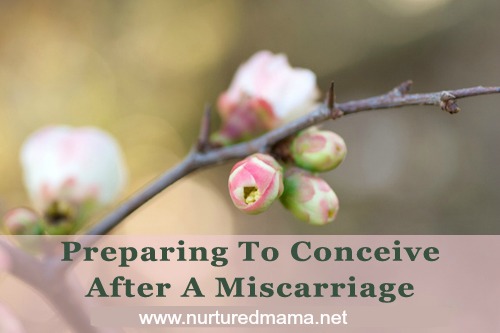Preparing to Conceive After A Miscarriage
 I originally wrote this post in 2013 for Modern Alternative Pregnancy, where I was a contributing writer. I wanted to share it again here, because I think these healing steps are so important (and often overlooked). This summer I sat on an exam table in an ER in Denver and heard a phrase I had hoped never to hear: “I’m very sorry, but we can’t find a heartbeat.”I was in the ER after a car accident, where they confirmed that I was only bruised, not badly injured, but that the baby I was carrying had died perhaps a week earlier, at nine weeks gestation. The doctor called it a “missed miscarriage,” which is when the fetus has died but the mother’s body hasn’t yet shown any of the usual signs of miscarriage such as cramping or bleeding. My body still felt pregnant, but the baby was gone.I declined the Misoprostol and D&C and flew home to let my body complete the process naturally. It took another couple of weeks, a round of acupuncture and Chinese herbs and a dramatic onslaught of bleeding before the fetus finally passed from my body.Several months have now passed and I have learned a great deal about how to heal both the body and the heart after the loss of a pregnancy.If you find yourself in this lonely and tender place, I hope the information in this article will help support you in preparing to conceive again.
I originally wrote this post in 2013 for Modern Alternative Pregnancy, where I was a contributing writer. I wanted to share it again here, because I think these healing steps are so important (and often overlooked). This summer I sat on an exam table in an ER in Denver and heard a phrase I had hoped never to hear: “I’m very sorry, but we can’t find a heartbeat.”I was in the ER after a car accident, where they confirmed that I was only bruised, not badly injured, but that the baby I was carrying had died perhaps a week earlier, at nine weeks gestation. The doctor called it a “missed miscarriage,” which is when the fetus has died but the mother’s body hasn’t yet shown any of the usual signs of miscarriage such as cramping or bleeding. My body still felt pregnant, but the baby was gone.I declined the Misoprostol and D&C and flew home to let my body complete the process naturally. It took another couple of weeks, a round of acupuncture and Chinese herbs and a dramatic onslaught of bleeding before the fetus finally passed from my body.Several months have now passed and I have learned a great deal about how to heal both the body and the heart after the loss of a pregnancy.If you find yourself in this lonely and tender place, I hope the information in this article will help support you in preparing to conceive again.
Support Your Body In Healing
Miscarriage is a traumatic experience for the body, as well as the heart. In my case, I experienced labor-like contractions for several days before the actual miscarriage, during which I had significant blood loss. I then had follow-on complications which required medical support, including a round of heavy-duty antibiotics.After a miscarriage you may feel surprisingly postpartum, with extended bleeding, a roller coaster of hormones and emotions, and bone-tired exhaustion. You may have night sweats or other trouble sleeping. It can be beneficial to supplement with additional Iron and Vitamin D and may also be a good idea to take extra Vitamin C and Echinacea to ward off infections. It is a good idea to stay hydrated and eat protein-rich, healthy and simple foods. Check with your doctor to see what he or she recommends for your particular situation.Let yourself rest as much as you need to - your body has been through a lot and is in recovery. You may need to sleep longer and nap or sit down more often. Too much strenuous activity will wear you out quickly and may increase your bleeding significantly. You may need some extra help during this time to keep up with household obligations. The six-week recovery period recommended for recovery after birth very much applies after a miscarriage.During those six weeks, take precautions to avoid an infection. My doctor warned me against intercourse until the bleeding subsided, but other sources also warn against hot tubs, douching and even baths. Even if you follow all of the precautions, as I did, your body may retain some tissue that could trigger an infection. Watch for the warning signs, which include cramping or tenderness in the uterus and abdomen, fever, or foul-smelling discharge. See a doctor immediately if you have any of these symptoms.
Process Your Grief
After my miscarriage, I felt angry for a long time before I felt sad. I worried that I was somehow at fault, that I had done something or failed to do something that put the pregnancy at risk. I was ashamed that my body had failed to keep this baby alive. I worried that I was too old to have another viable pregnancy. I was afraid I might not want to try again and risk another loss. I pulled away from my partner and grew impatient with my toddler daughter. I was angry at my body for the complications and how long it took to heal. It took several months for me to feel like myself again.The grieving process looks different for everyone and in every situation. There are several things that may help:
- Talk to people who have been there. When I miscarried I couldn’t think of anyone I knew who had experienced this kind of loss. But when I started talking to my friends about my experience I found out that several of them had recently miscarried and I never knew. Not only did those conversations help affirm my feelings, they brought us closer as friends.
- Create a closing ritual. Whether your loss was very early in the pregnancy or there was a tiny body to bury, give yourself the gift of a ritual to mark your loss and remember your baby. You may want to plant a tree, choose a name for your baby, or create some other memorial.
- Find someone to talk to. Talk to your partner about your feelings. He will be processing his own grief and sharing your sadness and healing will support for both of you. You may also find support from family, a grief councilor or other therapist, or support groups and forums for women who have experienced loss.
- Treat depression if needed. If you or people close to you are worried that you are showing signs of deep or ongoing depression, seek treatment. Untreated depression can be dangerous, especially once you conceive again.
- Give yourself time. Grief has its own timeline. It doesn’t end just because you want it to, or your husband is ready to try again, or your friends think you should be feeling better by now. Allow yourself to feel what you feel for as long as it takes. Be prepared for sadness to come up again at milestones, such as your expected due date, or the date you found out you were pregnant, or the anniversary of the loss.
Try Again When You are Ready
Different practitioners offer varying advice on how long to wait before conceiving again. Some say it is safe to try again as soon as the bleeding stops. My OB recommended two months and my midwife suggested three. The main reason for waiting is to allow your body to have at least one normal period before conception, which will allow clear dating of the next pregnancy.My acupuncturist’s perspective on the healing process was this:
- The first month allows the body to clear the pregnancy tissue and hormones.
- The second month allows your cycle to regulate.
- The third month is for your heart.
In my experience it really does take this long, if not longer, to grieve and recover, so this advice makes a lot of sense to me.Talk to your own practitioners and your partner to determine what is right for you both physically and emotionally.
Prepare For Pregnancy
If you have had repeated miscarriages, it may be a good idea to talk to a professional about testing to identify potential causes of your losses. However, if this was your first miscarriage, the odds are good that you will conceive again easily and have a healthy pregnancy.Preparing your physical body to conceive after a miscarriage is no different than preparing to conceive at any other time: Eat well, take prenatal supplements, avoid smoking and alcohol, track your cycles so that you know when you are most fertile.Preparing your heart may take a little more effort. Even if you have made peace with the actual miscarriage, being pregnant again will likely bring up fears and tenderness for you. Many women say that their fears tend to ease after they pass the milestone of the previous loss, but some women experience anxiety all the way through subsequent pregnancies. Talk about your feelings with people you trust and seek help if the anxiety or sadness feels out of control.Conceiving again after a pregnancy loss takes great courage and faith. These things will be most available to you if you have allowed both your body and your heart adequate support and time to heal.
If you have experienced a miscarriage, what did you find most useful in helping you be ready to conceive again?
